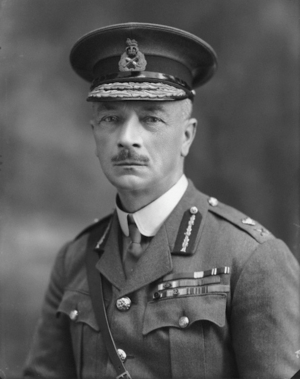Lovick Friend facts for kids
Quick facts for kids
Sir Lovick Friend
|
|
|---|---|

Friend photographed in 1920
|
|
| Born | 25 April 1856 Halfay Street, Sidcup, Kent, England |
| Died | 19 November 1944 (aged 88) West Kensington, London, England |
| Allegiance | |
| Service/ |
|
| Years of service | 1874–1920 |
| Rank | Major-General |
| Unit | Royal Engineers |
| Commands held | Ireland |
| Battles/wars | |
| Awards | |
Sir Lovick Bransby Friend (born April 25, 1856 – died November 19, 1944) was a high-ranking officer in the British Army. He reached the rank of Major-General. He was also a talented sportsman. He played football as a goalkeeper in a major final and was a skilled cricket player.
Friend was part of the Royal Engineers, a special unit in the army. He was in charge of the army in Ireland during the Easter Rising in 1916. This was a rebellion that happened during the First World War.
Early Life and Education
Lovick Friend was born in 1856 in Kent, England. His family lived near Sidcup. He was the fourth son of Frederick Friend, a rich businessman.
He grew up at Woollett Hall, the family home. He went to Cheltenham College for school. Later, he studied at the Royal Military Academy, Woolwich. He was very good at math in school. He won several awards for his studies. Even though he was good at sports, he didn't play for his school's main cricket team.
Military Career
Friend joined the Royal Engineers in 1874. He became a temporary officer, then a permanent one in 1876. He was stationed in places like Ireland and Hong Kong. In 1883, he became an instructor at the Royal Military College, Sandhurst. He was promoted to captain in 1885.
He worked on special projects for the Royal Engineers. He also trained soldiers in the British West Indies. In 1893, he became a major. In 1897, he went to Egypt. He helped organize supplies for the army during a conflict in Sudan in 1898. He worked closely with Sir Herbert Kitchener, a top British commander.
After a battle, he was praised for his actions. He received several medals for his service. From 1900 to 1904, he managed building projects for the Egyptian Army. He received more awards during this time.
Friend continued to rise through the ranks. He became a major general in 1912. In the same year, he took on an important role in Ireland. He became the top military commander in Ireland in 1914. This was the year the First World War started.
The Easter Rising
Friend was in command when the Easter Rising began in 1916. This was a rebellion by Irish nationalists. Before the uprising, he helped capture a ship carrying weapons. He also helped arrest Roger Casement, a key figure.
Friend then went on leave to England. He thought the danger had passed. But the rebellion started on April 24. Friend quickly returned to Dublin. He accepted the surrender of the rebel leaders.
Some people thought he made a mistake by leaving Ireland. He was later replaced by Sir John Maxwell. However, an official review did not blame him for what happened.
After 1916, Friend worked on a commission in France. This group handled claims for the British armies. He received more awards for his work. These included the Ordre de Léopold and the Legion d'Honneur. In 1919, he was made a Knight Commander of the Order of the British Empire (KBE). This was a very high honor. He retired from the army in 1920 after 47 years of service.
Sporting Career
| Cricket information | |
|---|---|
| Batting | Right-handed |
| Role | Wicket-keeper |
| Domestic team information | |
| Years | Team |
| 1873–1897 | Royal Engineers |
| 1886–1887 | Kent |
| FC debut | 8 July 1886 Kent v Sussex |
| Last FC | 15 June 1891 MCC v Kent |
|
Source: CricketArchive, 18 June 2022
|
|
Lovick Friend was a talented sportsman. He played cricket for his military academy. He also played regularly for the Royal Engineers Cricket Club. He was one of their best batsmen. He also served as the club's secretary for many years.
He was known as a "good wicket-keeper" in cricket. He scored 10 centuries (100 runs or more in one innings) for the Royal Engineers. Five of these centuries came in just one season in 1885. In that year, he scored 198 runs in one game.
Friend played his first "first-class" cricket match for Kent County Cricket Club in 1886. First-class cricket is the highest level of the sport. He played a total of six first-class matches. He scored 189 runs in these games. His highest score was 72 runs. He played for several other teams too, including MCC. He even played in Hong Kong when he was stationed there.
Friend also played association football (soccer) for the Royal Engineers team. He was described as "always cool and a sure kick." He played as the goalkeeper for his team. He even played in the 1878 FA Cup Final, which is a very important football match.
Later Life
After retiring, Friend spent time in South Africa and Australia. He passed away in a nursing home in London on November 19, 1944. He was 88 years old.
 | Emma Amos |
 | Edward Mitchell Bannister |
 | Larry D. Alexander |
 | Ernie Barnes |

